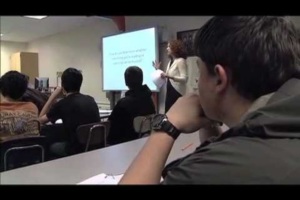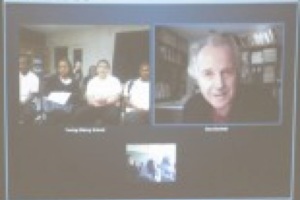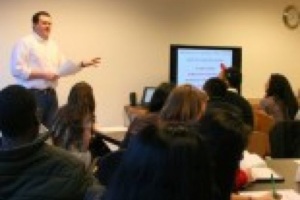The News Literacy Project is now offering its first all-digital unit in Chicago schools and launched its first pilot of the unit in New York this week. It plans to offer a version of the unit in Washington, D.C., in the next school year.
The initial response to the unit among Chicago teachers and students has been overwhelmingly positive.
“Tying in the real world … makes us feel like we’re important as human beings and as growing young adults,” said Jade French, a senior at Alcott High School. “I’ll carry that with me forever.”
A short promotional video for the unit in Chicago is available here:
http://thenewsliteracyproject.org/digitalpromo
NLP began its first New York unit this week at the Frank Sinatra School for the Arts in Queens and plans to offer additional units this spring.
The project views the digital unit as its prime path to reach national scale in a sustainable way with significant impact.
The unit is a blended e-learning experience that is broken into five 45-minute segments, each of which consists of three to four digital lessons and teacher-led discussion. The content is designed to be delivered in a computer lab setting, in a one-to-one (one screen per student) ratio, and includes a comprehensive guide that provides teachers with discussion prompts, homework assignments and technical and logistical support.”
The first four days of the unit are aligned with NLP’s four pillars, or essential questions, and the fifth day contains a summary or capstone activity using NLP’s “How to Know What to Believe” infographic. The unit also involves a live webinar with an NLP journalist volunteer the afternoon of the fourth day, which students are assigned to join from home or other locations with a high-speed Internet connection.
The Chicago-based unit is narrated by Nancy Loo of WGN News Chicago and features Fernando Diaz, managing editor of Hoy; Chicago Tribune religion reporter Manya Brachear; Chicago Sun-Times metro editor Paul Saltzman; former WBEZ Chicago reporter and host Steve Edwards; and volunteers from The Associated Press and the Chicago Sun-Times.
In November and December, NLP completed its second round of pilots with eight schools and about 500 students in Chicago. The response was tremendously favorable.
NLP captured some of the teachers and students comments in a video that can be viewed at http://www.thenewsliteracyproject.org/digitalfeedback.
“The way we used technology in the News Literacy Project was very unique because it was like we were being taught one-on-one by either a reporter or an editor…so you could kind of relate to the person speaking,” said Steven Cooper, an 8th-grade student at Spencer Technology Academy in Chicago.
Eighth-grade English Language Arts teacher Shelli Shadday said, “The common core standards are about digging deep, and about analysis, and analyzing information, and I feel like this is what this was all about. And the essential questions that [NLP] provided really align with that.”
In a recent report on the assessment data from the unit, Anita Baker of Evaluation Services said, “The following results show that, as during the initial pilot, many students enhanced their news literacy-related knowledge and skills and changed their attitudes regarding the importance of the press…overall, students valued the project and the digital delivery. Teachers corroborated both the learning and the favorable response by students, and shared that it was worthwhile for them, too.”
The report added that “nearly all (95%) of respondents agreed or strongly agreed that they learned a lot of important and useful information. A majority of respondents agreed that the digital unit made them more confident in their ability to evaluate news and information (89%) and that the webinar was interesting, educational and useful (81%).”
All six teachers rated the unit as “good” or “excellent” and all said that it helped them meet state or national teaching standards. All reported that student attendance, discipline, work completion, critical thinking, researching, and academic interest were maintained or got better during the unit. All the teachers also said students had shown “a gain in the ability to identify credible information” and two-thirds said the students had “gained a greater understanding and appreciation of quality journalism.”
NLP is offering the Chicago digital unit four more times this spring — once per month from March to June — and has already confirmed five new participating schools across the city and has seen interest from at least 10 others. The project expects to reach between 500 and 1,000 additional Chicago Public Schools students this spring.
The New York version of the unit includes the same learning content narrated by New York journalists. The host for the unit is Ron Claiborne, veteran reporter and anchor at ABC News. Cheryl Wills, longtime reporter and weekend anchor for NY1 News, hosts the “Why News Matters” lesson, walking students through the importance and impact of the news. The unit also features Lam Thuy Vo, a digital reporter for NPR’s Planet Money, and Jonathan Woods, Time photo editor, each of whom narrated one of the steps in NLP’s process for checking the credibility of a news item or piece of information.
NLP plans to create a comparable unit for Washington, D.C., featuring journalists in the nation’s capital. The unit is expected to be ready to pilot in the 2013-14 school year.



